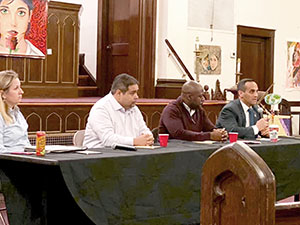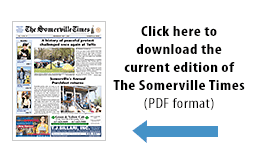
The recent community panel discussion provided residents and civic leaders with an opportunity to engage in a dialog concerning challenges faced by immigrants and the cities that take them in. — Photo courtesy of Nave Gallery
By Lizzie Heintz
On Sunday, November 17, citizens of Somerville gathered at the Nave Gallery, inside the Clarendon Hill Presbyterian Church, for a community panel discussion on “The Importance of Sanctuary Cities.” Speakers at the panel were Somerville Mayor Joseph Curtatone, Prof. Susan Akram of Boston University, Executive Director of the Somerville Welcome Project Ben Echevarria, and Somerville Councilor At-Large Wilfred Mbah.
Sitting at the front of the room, each of the guests spoke at length about their connection and stance regarding Somerville’s immigrant population. The comments held strong undertones of the current state and national political climates.
“To say that today’s country is a land of equal opportunity for all … that’s just not true.” Curtatone said.
Residents were given the opportunity to view the exhibition in the Nave Gallery, Crossing the Line: In Search of Sanctuary, before the panel began. The exhibit featured art highlighting issues relating to immigration and social justice. The church sanctuary also featured art from the collection Art in Exile: Works from Syrian Refugee Camps. Echevarria touched on the issues specifically relevant to those he works with in Somerville.
“Somerville is a very different place from when I was growing up,” Echevarria said, “When I was in school, my sisters and I were the only people of color in the entire school system. Today, about seventy percent of our school district is students of color. You look at what’s happening nationally. What we’re discovering and what we’re seeing is how to legalize hate, how to legalize racism, how to legalize everything that we’re so far against.”
Echevarria also touched on laws other states have put in place to help undocumented students that Massachusetts has yet to adopt, such as Texas’s law allowing undocumented students to have in-state tuition for college and university. He also noted Utah’s law allowing undocumented immigrants to apply for a driver’s license, another thing Massachusetts has yet to adopt.
Attendees were given the opportunity to speak on the subject and ask questions of the speakers after the presentations were done. Concerns were raised about the lack of affordable housing available to immigrants, as well as the accessibility of educational resources for immigrant children looking to enter university. Other residents raised the point that many misconceptions about immigrants could be solved simply by speaking with them.
“That was me. We were those teenagers on the corner speaking Italian,” one resident said, referring to a complaint that teenagers were speaking Spanish on street-corners in Somerville neighborhoods. Residents in attendance expressed their appreciation for Somerville’s openness in regards to immigrant residents, but also made sure to note the changes they wished to be made in the community to help foster a more inclusive environment.












Nothing is at stake for anybody who is in the country legally. The only issue is whether people *illegally* in the country should get driver’s licenses, affordable housing, other social perks, or be protected from deportation when they get arrested for something else. Frankly, I say no and it’s not racist or xenophobic. We have immigration laws and they should be respected. I’m disappointed that this article doesn’t acknowledge this…. in fact it doesn’t use the word “illegal” and ignores the fundamental issue entirely.
As an aside, I have to wonder how much affordable housing would open up for residents if those illegally in Somerville were deported? Or how much money we spend on social projects could be saved or redirected to those with legal standing to be here?